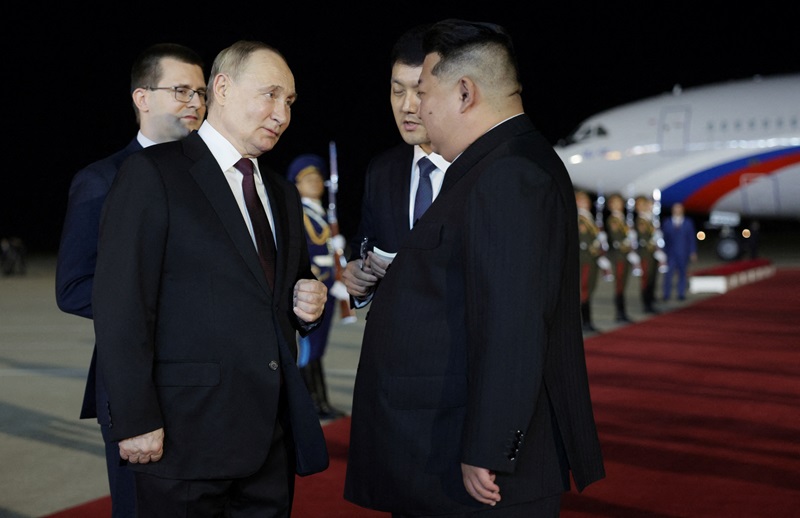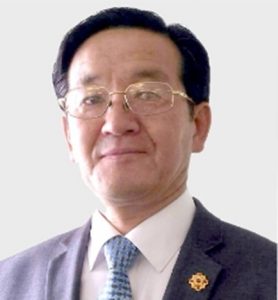Russian President Vladimir Putin, who has failed to fulfill his promise to unify the Korean Peninsula for 80 years, should prioritize honoring his international commitments instead of instigating conflict.
President Putin stayed one day in North Korea after a meeting on June 19, 2024. Due to his late arrival, the planned two-day itinerary was reduced to a day trip. This visit symbolized Russia’s growing military ties with North Korea and was the first visit by a Russian leader to North Korea in 24 years. It was also the first since North Korea closed its borders due to COVID-19 in 2020, highlighting the country’s isolated diplomatic approach.
President Putin’s habitual tardiness was evident once again. In the past, on June 4, 1990, former President Roh Tae-woo postponed the Jeju summit to the 5th to wait for former President Boris Yeltsin, demonstrating Russia’s lack of basic leadership standards.
On June 19, President Putin began his visit with an official welcoming ceremony at noon, signed the Comprehensive Strategic Partnership Agreement with North Korean leader Kim Jong-un following a summit, and left late that night. His tardiness was disrespectful to the host country. He was 1 hour and 45 minutes late for a meeting with former President Park Geun-hye in 2016, about 2 hours late for a meeting with Moon Jae-in at the 2019 G20 summit, and 2 to 4 hours late for meetings with Germany’s Angela Merkel and Japan’s Shinzo Abe.

First, the Yalta Conference on February 11, 1945, where representatives from the United States (Roosevelt), the Soviet Union (Stalin), and the United Kingdom (Churchill) agreed on the “disarmament of the Japanese military” and promised the political independence of the Korean Peninsula. However, nearly 80 years later, the division of the Korean Peninsula at the 38th parallel remains, influenced by Russia’s historical actions.
Second, the Moscow Foreign Affairs Conference on December 26, 1945, following the Potsdam Declaration, where the foreign ministers of the United States, Soviet Union, and Britain declared the launch of the “American-Soviet Joint Committee” for the unification of Korea within 10 days. However, even after 80 years, this joint committee has not materialized, largely due to Russia’s support of Soviet-made tanks during the Korean War on June 25, 1950.
This visit to North Korea, without repentance for the Korean War, symbolizes violent diplomacy. We call on Russia to refrain from encouraging such violence, to apologize to the international community for provoking the Korean War, and to fully compensate for the devastation caused to the Republic of Korea and the pain inflicted on separated families.
President Putin should lead the way in opening the path to peaceful and free unification for 80 million Koreans by honoring the commitments made by international leaders.
The Republic of Korea, strengthened by the ROK-US alliance, now possesses significant national power, military capabilities, and world-class economic value. Despite the hardships of the Korean War, South Korea has become an advanced country in culture, economy, security, science, technology, religion, and education.
Conversely, North Korea, supported by Russia, has become one of the world’s poorest countries due to its misguided alliances. Russia and China should take responsibility for their actions and cease encouraging violence.
As the saying goes, “Whatever a person sows, that is what he reaps.”

By Hoi C. Kim
The author is chairman of the Korea-US Alliance Strengthening-Foundation.

![Clovine accelerates global expansion in collaboration platform market Website of Clovine, a cloud-based project management provider [Screenshot]](https://www.koreadailyus.com/wp-content/uploads/2025/04/0403-clovine-100x70.jpg)

![Hangar images indicate North Korean advances in military drone domain Satellite photos taken on March 28, included in Beyond Parallel's report on North Korea, shows what appears to be seven new drone hangars at the Banghyon Air Base. [SCREEN CATPURE]](https://www.koreadailyus.com/wp-content/uploads/2025/04/0402-Hangar-100x70.jpg)
